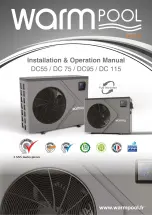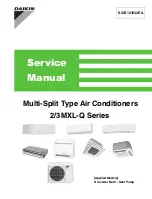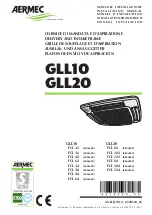
JOHNSON CONTROLS
38
FORM 100.50-NOM6
ISSUE DATE: 8/07/2017
SECTION 2 – INSTALLATION
CONDENSATE DRAIN
Condensate Drain Piping
The YPAL cooling coils are located in the units so that
the supply air is drawn through them. This results in
the condensate being subjected to negative (-) static
pressure. Unless some means of pressure equalization
is provided in the condensate drains, the air rushing
back through the drainpipe will cause the condensate to
build up in the base rails. As the unit continues to oper-
ate, the accumulated water will be carried with the air
stream, overfilling the base rails causing possible water
leaks into the supply duct and/or causing water damage
in the building. A trap must be installed to prevent this
condensate water build-up (
see Figures 12 and 13
).
Under high latent load conditions condensate may
form in the base and side rails of the unit. The unit is
designed to contain this moisture and prevent it from
leaking into the conditioned space. In order to dispose
of this condensate, two condensate drain connections
are located on the side rails on each side of the unit and
in the base rail on the return end of the unit. There are
six (6) condensate drains on the unit. Since these con-
nections are also under negative pressure, they must
be trapped using the same design criteria as the main
drain pan.
LD05370
H Must Be At Least
1 Plus Fan Total
Static Pressure
H
"X"= 1/2 "H"
X
FIGURE 12 -
TRAP DETAIL FOR DRAW THROUGH
APPLICATION
Condensate Drain Trap
For
“Draw-through”
applications install a trapped
condensate drain line at unit drain connection (
according to all governing codes.
“H” dimension must be at least 1 inch greater than de-
sign Total Static Pressure (TSP) of fan.
The trap and drain lines should be protected from
freezing. Plumbing must conform to local codes. Use
a sealing compound on male pipe threads. Install con-
densate drain lines from the 1-1/4 inch NPT female
connections on the unit to an open drain.
The unit must be properly trapped and
charged with water before the units are
started.
AIR HOODS FOR ECONOMIZER
There are two (2) economizer outside air intake hoods
provided with the unit. The front and rear hoods are
made operational per the following instructions:
•
Remove the screws holding the economizer hood
shipping covers in place. Discard covers.
•
Apply a bead of RTV sealer along the edge of
both hoods and each pivot joint to prevent water
leakage.
•
Rotate the hoods out (each hood is hinged). Secure
the hoods with screws along the top and sides.
•
Seal any unused screw holes with RTV or by re-
placing the screw.
AIR HOODS FOR FIXED OUTSIDE AIR (UNITS
WITHOUT ECONOMIZER)
The hoods must be installed per the above instructions.
The dampers may be adjusted by loosening the thumb
screw, turning the lever to the desired position, and re-
tightening the thumb screw.
AIR HOODS FOR EXHAUST AIR
No hoods are required for the exhaust air outlet.
FIELD WIRING
Simplicity control board. All field control wiring is
field supplied and installed.
Thermostat
A thermostat (4 stage cool and 3 stage heat) can be
used on CV and VAV units. On CV units the thermostat
is the primary means of control for the unit. The three
thermostat heating inputs connect to the P2 terminal
block on the Simplicity control board to terminals W1,
W2, and W3. The four thermostat cooling inputs con-
nect to the P2 and P3 terminal block on the Simplicity
control board to terminals Y1, Y2, Y3, and Y4.
















































